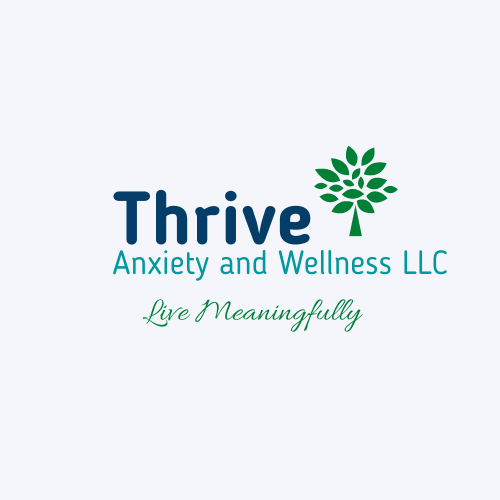Clinical Information
Thrive Anxiety and Wellness provides therapeutic services to meet your individual and family's needs.
Therapy Services
- Therapy services are offered to all ages including infants and their parents, children, adolescents, and adults.
- Specialized services to treat anxiety, Obsessive Compulsive Disorder (OCD), sleep problems, pain management, and learning to cope with medical conditions.
- Thrive offers telehealth counseling services so that you can easily receive care within the state of South Carolina. All you need is a computer, phone or tablet that has access to internet and has a microphone and camera. The video therapy sessions are conducted on a secure site that is as easy to use as pushing a button. Dr. Huss can provide instructions and can even do a trial run to help you learn the system.
Specialty Areas
Anxiety Disorders and OCD
- Separation Anxiety
- Panic Disorder
- Generalized Anxiety Disorder
- Social Anxiety
- Specific Phobias
- Illness Anxiety Disorder
- Somatic Symptom Disorder
- Obsessive Compulsive Disorder
- Excoriation or Skin Picking
Other Areas
- Pain
- Sleep Problems
- Adjustment to Medical-Related Issues

Anxiety Disorders and Obsessive Compulsive Disorder (OCD)
Everyone worries, especially in today’s world, but your worry may meet criteria for an anxiety disorder if the worry is frequent, is difficult to control, and begins to impact sleep, concentration, work or school, and your interpersonal relationships. Anxiety can be accompanied by strong physical sensations and restlessness. For children and adolescents, anxiety may look like irritability, tantrums, or disobedience. Common Anxiety Disorders for which psychological treatments are available include:
- Separation Anxiety for children- Children with separation anxiety feel safer with family and may resist being separated from trusted others or may experience more distress (irritability, tantrums, crying spells) when having to separate from loved ones. While some separation anxiety is common for toddlers, if these symptoms are so frequent and intense that the amount of distress is prolonged, the child begins to vomit, or the anxiety significantly disrupts the family’s daily functioning, treatment is warranted. Often parents and the child participate in treatment together.
- Panic Disorder involves many intense, physiological symptoms that can occur out of the blue, in the middle of the night, or occur around certain environmental triggers. Physical reactions (e.g. rapid heart rate, dizziness, difficulty breathing, chest pain, abdominal pains, nausea etc.) can occur and lead to a strong desire to escape. Individuals with panic may naturally be concerned that they are having a significant medical event such a heart attack. Individuals with panic begin to worry about the next episode of panic and may avoid places that may trigger attacks or prevent escape if a panic attack occurs.
- Generalized Anxiety Disorder (GAD) typically involves the worry of many different worries that frequently run through a person’s mind making it difficult to focus. These thoughts can get stuck or can race. Often individuals GAD may also feel restless, have difficulty relaxing, and can experience periods of irritability.
- Social Anxiety involves the frequent worry that one will be judged negatively by others, will fail or will do something embarrassing while in public. This worry can cause individuals to avoid larger crowds, meeting new people, or attending events alone. Individuals can feel very self-conscious and spend time evaluating how they are coming across to others or they may limit/avoid social interactions at all. Students may become anxious while walking in the hallway at school or experience significant worry about being called on to answer questions in class.
- Specific Phobias involve being afraid of certain places, situations, or items. Common phobias include fear of throwing up, fear of needle or medical procedures, fear of driving, fear of flying, fear of the dark, fear of heights, fear of closed spaces. These situations are either entirely avoided or tolerated with significant distress.
- Illness Anxiety Disorder or Health Anxiety is when individuals excessively worry about developing a medical condition even if no physical symptoms are present. Individuals with this type of worry may be very aware of their bodies and easily notice any new sensations or changes in sensations (e.g. change in heart rate, a muscle twitch etc.) worrying that these are indications that there is a serious medical problem. Headaches, muscle pains, stomach discomfort or other common physical ailments may cause great distress as the individual may fear it is the sign of a more serious medical illness.
- Somatic Symptom Disorder is an illness where individuals have become significantly focused on physical symptoms they are experiencing, such as pain or dizziness that has led to significant emotional distress and difficulty functioning in one’s life. Unlike Illness Anxiety Disorder, the concern is not about the development of a medical condition but is primarily focused on the symptoms themselves and how they impact one’s life. The symptoms are real and doctors may or may not have identified an exact medical reason for the symptoms to be present.
- Obsessive Compulsive Disorder (OCD) is a common disorder that can occur in childhood through adulthood in which frequent, intrusive thoughts or images (compulsions) come into one’s mind leading to extreme anxiety, physiological arousal, and are difficult to refocus onto other topics. Individuals struggling with OCD engage in compulsive behaviors, which are behaviors intended to get rid of avoid these unwanted thoughts or images. While most people easily think of OCD symptoms related to fear of getting sick, there are many other common symptoms of OCD including the fear of losing control (saying or doing something that may harm others, oneself, or be embarrassing), fear of being responsible for something bad happening, fear of making a mistake or doing something wrong, and the fear of being a bad person or angering God. Additionally, OCD can focus around the need for having things look or feel “just right”, being even or symmetrical, or being perfect. Other OCD symptoms include intrusive, unwanted sexual thoughts or images, obsessions about one’s sexual orientation, obsessions about one’s appearance, or a physical part of one’s body.
- Excoriation or Skin Picking is a disorder that can occur with anxiety, OCD, or alone that involves repeated picking at one’s skin that leads to problems with one’s skin or disrupts one’s daily life. Trichotillomania or Hair Pulling is another disorder that is often experienced with individuals with anxiety or OCD in which individuals repeatedly pull out hair from different parts of the body including eyebrows, scalp, and eyelashes. The pulling can lead to bald spots, infections, and disrupt daily life.
Pain
While pain is a common phenomenon that all individuals experience from time to time, individuals who experience pain on a consistent basis can experience significant disruption in their lives. Psychological treatments for Pain conditions have been found to be very effective that are not as costly or do not have as many side effects as other treatments. While treatment may also focus on the subsequent anxiety or depression that may result from having pain, the primary treatment focuses on managing the pain itself. Treatment includes relaxation strategies, biofeedback, mindfulness meditation, behavioral changes, and addressing thoughts associated with the pain. Dr. Huss treats many pain conditions including migraines, tension headaches, Fibromyalgia, back and neck pain, and Irritable Bowel Syndrome and other Brain Gut Interaction Disorders.


Sleep Problems
Sleep problems, including difficulty falling asleep, staying asleep, and daytime fatigue, are very common in children and adults. While sleep problems can be the result of medical, mental health, and environmental stressors, research indicates that sleep disturbance can lead to or exacerbate pain, hyperactivity, anxiety, depression, and impact learning and focus. Psychological treatments for sleep problems are effective and have less side effects than medications prescribed for sleep problems. Dr. Huss also works with parents of infants and toddlers to help children learn to fall asleep on their own and develop healthy sleep habits.
Adjustment to Medical-Related Issues
Medical diagnoses can significantly disrupt one’s life, goals, and can easily become the center of one’s daily life. Many chronic conditions may require significant lifestyle changes such as diet changes, rigorous medical treatments or check-ups, or changes in exercise regimen. Individuals may have lost functioning in certain body parts or had to have body parts removed. These unexpected changes not only impact what we do, but how we see ourselves or how we believe others see us. Psychological treatments focus on learning how to accept and adjust to the disorder while refocusing on rediscovering one’s values, beliefs, and getting back to life. Common disorders treated include cancer, heart attacks, stroke, diabetes, chronic fatigue, fibromyalgia, and multiple sclerosis.
Accepted Insurance Providers
We accept Blue Cross/Blue Shield insurance. If we are not in-network, we can provide a superbill and explain how to submit the claim to your insurance company. Self-pay for initial intake is $200. Follow-up sessions are $175.


